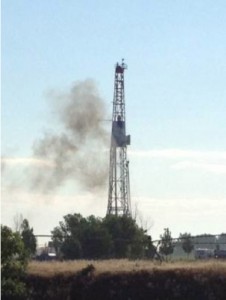 July 16, 2014 12:03 PM UTC
July 16, 2014 12:03 PM UTC

As 9NEWS' Brandon Rittiman reports, Gov. John Hickenlooper is giving up on the idea of a special session of the legislature this year to pass legislation giving local communities greater control over oil and gas drilling. That means two measures supported by Rep. Jared Polis to increase setbacks from drilling and establish an "environmental bill of rights" for Coloradans, are likely a go for this November's ballot:
Talks aimed at brokering a compromise to allow increased local control over oil and gas drilling operations have failed, Gov. John Hickenlooper's (D-Colorado) office reported Wednesday.
The governor's office says there will be no special session – as Hickenlooper had hoped – to pass a compromise law on fracking.
"Despite our best efforts and those of other willing partners," the governor said in a written statement. "We have not been able to secure the broader stakeholder support necessary to pass bipartisan legislation in a special session."
That news all but ensures Colorado voters will have the opportunity to weigh in with a statewide vote on fracking this year, a follow-up to local ballot questions which have halted the practice in four Front Range communities.
With the special session now dead, as many observers expected, Sen. Mark Udall was quick to announce his opposition to the ballot measures:
"Fracking can be done safely and responsibly," Udall wrote shortly after the governor's announcement. "I believe that Colorado can and must do better, which is why I oppose these one-size-fits-all restrictions."
Undaunted, Rep. Polis announces he is moving ahead:
“I have said from the beginning of this debate that my one goal is to find a solution that will allow my constituents to live safely in their homes, free from the fear of declining property values or unnecessary health risks, but also that will allow our state to continue to benefit from the oil and gas boom that brings jobs and increased energy security,” Polis said.
“I stand by this goal, I am confident that the majority of Coloradoans share this goal, and I am committed to continuing to work to protect our Colorado values.”
FOX 31's Eli Stokols reports that the American Petroleum Institute, which plans to spend a great deal of money fighting these initiatives, hardened opposition among Republicans and the oil and gas industry against a compromise with a poll indicating they can beat the ballot measures. On the other side, proponents have polling that says the measures can pass–even after respondents hear the industry's arguments against the measures.
Stokols speculates once again about the measures "potentially jeopardizing the reelection of Hickenlooper and Sen. Mark Udall — and, by extension, Democratic control of the senate." As we've said previously, that is a dubious suggestion at best. We also don't believe that high-profile Democrats steering clear of these initiatives hurt either the initiatives or their re-election campaigns–there's a lot more driving those campaigns than this one issue, and by disavowing the initiatives early, there's nothing to use against Udall or Hickenlooper even if they do go badly. As for Rep. Polis? The FOX 31 story a week ago, trying to cast CD-2 Republican candidate George Leing as a credible opponent–which even most Democrats opposed to Polis on this issue found laughable–makes it pretty clear he doesn't have much to worry about. That said, we expect the industry will do whatever they can to extract a cost from Polis for his "impertinence."
In November, all of these assumptions will meet their ultimate test–and somebody's going to be wrong.
Subscribe to our monthly newsletter to stay in the loop with regular updates!
Comments